If a cat is hiding, go over and try to relieve its stress. How? By playing! Even if she decides to stay in her hiding place, if you can get even the slightest bit of attention, her stress level should at least go down a bit.
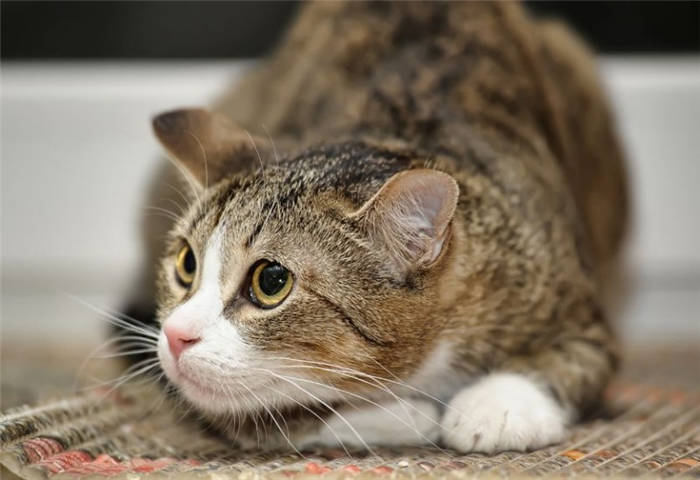
- Is your cat afraid of strangers? Here are some tips on how to change that
- It's the guests' fault!
- Light phobia as a normal occurrence
- Stress or fear
- How to fight
- A cat is afraid of one person.
- Insufficient socialization
- Cat is wildly afraid of strangers
- The kitten is constantly hiding, screaming and afraid of everything
- How do you help a cat overcome fear and anxiety?
- Why is the animal afraid of the owner?
- Mental disorder as a cause of high anxiety
- How to minimize the stress of visitors
- How to accustom the cat to guests
Is your cat afraid of strangers? Here are some tips on how to change that
Does your cat hide as soon as the doorbell rings? It doesn't have to be that way. Learn how to change that!
Cats never cease to amaze us with their variety of personalities. Some cats are very affectionate and trusting of everyone, while others tolerate only their owners and family members. Sometimes the opposite is also true. A cat's fear of strangers leads to aggression or sitting under the bed for hours. If your cat is particularly "shy," or if you're worried that the stress caused by guest visits may be detrimental, this article is for you!
It's the guests' fault!
Even if your pet doesn't run away in a panic at the sound of the doorbell, but hides as soon as guests arrive, the blame may lie with them. Certain behaviors increase a cat's fear of strangers. Such as. People who love cats but unfortunately don't know their character make a typical mistake in dealing with them. Often they want by all means to pet the cat, take it in their arms or even hold it in their lap, even if it desperately resists. Others try to play with the cat at all costs, creating a lot of unnecessary noise. A few episodes like this are enough for the cat to realize that it's much safer to hide, because guests mean a lot of trouble for it.
Cats are territorial animals. In the wild, they regularly patrol their territories and mark them with smells and visual signs (scratches) so that other cats know the place is occupied. Pets do the same in the apartment. Walking with dignity, sitting on the couch or watching from the windowsill, they patrol, scratching the corner of the couch or the door frame, leaving visual signs of their possession.
The arrival of guests is undoubtedly an intrusion of strangers into the cat's home. While not every cat treats strangers as enemies – some will greet anyone who shows up at the door with curiosity – most cats, at least at first, will view a visitor as an uninvited guest.
Some cats will watch the stranger from afar, some will disappear and show no signs of life before the visitor leaves, others – and this is probably the worst case scenario – will react with aggression. Certainly, any cat that is not happy about the doorbell will be stressed when we are having a pleasant time, such as over dinner with friends.
Fortunately, a cat's fear of strangers can be lessened or even eliminated, and it's worth doing! Every dose of stress for our pets can have a host of negative consequences.
Light phobia as a normal occurrence
Kittens come into the world blind. Their eyes are closed for a reason, they are still forming and preparing to meet a serious, irritating factor – light. The pupils, which dilate and contract, are partly responsible for the normal perception of light and visual information. When a kitten first opens her eyes, her pupils do not have time to adjust to the brightness of the light. You can see how babies turn their muzzles away from light sources and try to crawl into the far corner of the nest. This phenomenon is quite natural and is not related to photophobia.
A cause of photophobia in adult cats that cannot be overlooked is pregnancy. Cats expecting to breed behave very differently, some become more sociable, others more irritable. However, all pregnant cats have one thing in common: the closer the delivery date comes, the stronger the desire to set up the nest.
Cats of certain breeds do not set up the nest by themselves, but wait for the owner to take these steps. Usually the pet is very anxious, meows, calls for the owner and tries to take her to the supposed nest site. In this case, your job is to set up a soft bed and keep an eye on your pet, since she will also be counting on you to give birth.
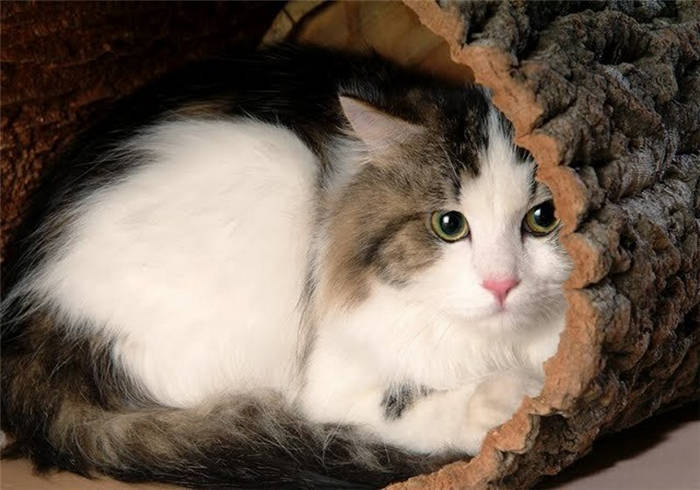
The cat, arranging the nest by itself chooses a dark place and sits in it for a long time. Your task is to read her mind and free up a favorite place to arrange the nest. Believe me, this is in your best interest, because for most expectant mothers the perfect nest seems to be a shelf with your clothes. To keep the cat from hiding, you need to help her set up her nest:
Tip: If your cat is pregnant and often hides, you need to move bowls of water and food closer to the chosen shelter, so the cats will be more comfortable and calm.
Stress or fear
Stress is the most damaging factor to an animal's health. There's nothing like it to weakens the immune system and the body as a whole like constant worry, lack of opportunity to rest and get a good night's sleep. Fear and stress are closely related and often inseparable. Fear of a cat may not be obvious, since four-legged animals are good at disguising their condition.
Common causes of guaranteed and severe stress include:
- Moving, an abrupt change of scenery or a trip.
- A trip to the veterinary clinic.
- The arrival of a child, new roommate or pet in the home.
- Unfamiliar or noisy guests.
- Lack of communication with the owner.
- Escape of the cat from the house.
There are so many reasons for mild to moderate stress that it is pointless to list them all. It is important to understand that a cat can get nervous for any reason. Very often the owners sincerely love the cat and give it the best of everything, and the cat gets stressed out because it smells another animal at the front door or sees a competitor from the window. You can't account for all the factors, it's physically impossible, so it's worth following the general recommendations of competent veterinarians and experienced owners.
How to fight
In order for a cat to stop being afraid of people you need to stop it Praise and encouragement Until it becomes friendly to strangers. If the cat runs away into a dark corner after a visit, you need to take it out and pet it. You may also take the cat in your arms and sit among the guests, allowing them to pet it.
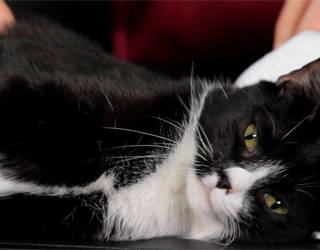
If the animal does not want to make contact and snorts, you should not go against its will, you will only make it worse. Harm the cat and you will find yourself scratched, and the problem will never be solved.
In order for the cat to feel safe with guests it can be introduced from a carrier bag or a cage, behind which it will feel confident. Your guests should be asked to behave calmly and not to make any noise, otherwise this will only scare the animal. But you shouldn't expect that the cat will be used to the guests, it should be accustomed to them gradually. When the cat will get used to the guests in a carrier, you should put it in front of them and let it pet you, so that the cat will understand that no one wants to harm it.
Also you can develop reflexes in the cat, for example, to prove to him that after the bell or knock on the door only good things happen. It is possible to stand at the door yourself, and when it opens, the animal will only be happy for its owner and will understand that nothing bad will happen if someone comes to visit.
You can also trick the cat, for example, during the day not to give her anything to eat. And when the guests come, you can place a bowl of food next to them, if the animal is very hungry, it will overcome its fears and come to the bowl, realizing that strangers are not dangerous for it.
You can also use sedativesBut only if your veterinarian recommends it, or you may cause an addiction.
To overcome your pet's fear of strangers, you should listen to the following recommendations:
A cat is afraid of one person.
Cats have a good memory, and if she was once hurt by a person, they will remember it for a long time, and are unlikely to treat him well. By the way, there are cases when cats are afraid of people who have not done anything unpleasant to them, maybe it is about the intolerance of this or that person.
Cats can remember unpleasant moments even from their childhood. These can be situations that you do not know about. But since the animal was small, it remembers only the features of the person, and therefore can easily confuse it with someone else, and therefore will be afraid of specific people. Therefore, do not blame the animal that it is afraid of people, it's all its past.
It is worth noting that cats are rarely afraid of women, because their voice reminds them of the cat's one. That is why animals are happy to go to women, and bypass men. All cats are afraid of small children on a subconscious level, because they are constantly screaming, making noise, and crying.
In general, fear is a normal phenomenon that can develop in any living creature. And there is nothing strange about it, because a cat is an animal with instincts and there is nothing wrong with being afraid of something.
Insufficient socialization
You bought a kitten, you didn't have visitors for half a year, but then the feast happened. Arriving people have thrown the cat into a panic, she crammed under the couch, screaming and shivering. First of all, you made a mistake by not socializing the animal as a child, in fact, the cat knows only you and fear of guests is a normal reaction. Secondly, you can help the pet by putting it in a separate room, letting it hide and closing the doors – in the midst of the celebration, this option is optimal.
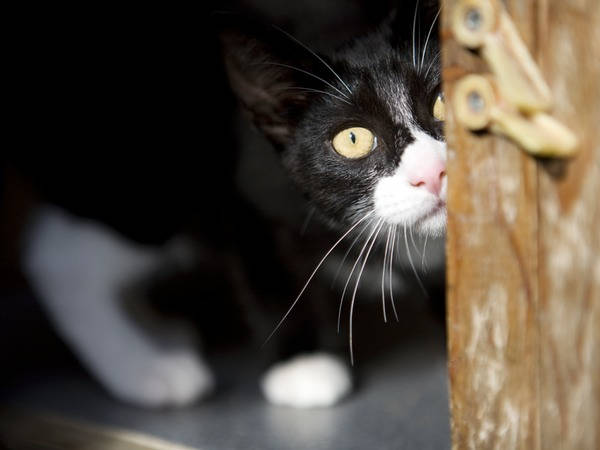
Many tail owners prefer not to deal with this kind of behavior, justifying it by saying that the cat doesn't have to love everyone. The truth is that a pet really doesn't have to love anyone, but fear, it's stressful and therefore harmful to the body. Socialization of an overgrown pet is done gradually, at first, with the use of sedatives.
Invite one guest, once a week and do not rush the events, the ward must itself show initiative and come out to a stranger. It is not bad if the guest brings a gift or a toy for the pet. Give the cat a treat or toy from your hands, that's enough. Once the cat smells someone else's scent and associates it with positive emotions, it will become a little more confident. The following method leads to a faster effect:
- A close friend (whom the cat has seen before) or a family member plays the role of a guest.
- Put your ward in a carrier, put the "house" in the room where you will be receiving guests and cover it with a thick towel. The four-legged dog should be able to look out through the netting, but not in full view of people.
- Play out the scenario – the doorbell rings, "Hi, it's good to see you, come on in."
- Even if there is a noise coming from the carrier – you don't react, but if the cat screams – the carrier should be moved to the next room or hallway. The cat should hear people, but not see them.
Cat is wildly afraid of strangers
Hello!
My kitty is about 7 months old (she was spayed a week ago, vaccinated and healthy).
Two months ago she was picked up on the street. Since then, she only trusts the girl she lives with. In front of strangers hides, shakes, wildly afraid. Only understands that a stranger came in – the cat changes before her eyes and disappears.
In this case, the mistress – an ideal cat. Gentle, sociable, playful.
This behavioral problem for these two months, with no change.
Some cats cannot stand the appearance of strangers in the house. One of the reasons for this behavior is the lack of communication with people at an early age: sometimes it is enough for a cat to hide from invitees for the rest of its life, one incident when the guest was too noisy or mistreated the kitten.
A particularly nervous and fearful cat may be given a sedative – special drops, but you should not give such a remedy permanently. A sedative is only a small help, which helps to speed up the process of getting used to strangers. In any case, with or without drops, frequent encounters with people should help the cat understand that the arrival of guests is no threat to it. It is very important that the cat, without running away, learns to allow strangers at a sufficiently close distance.
One way of accustoming the cat to guests is not to let it run away and hide. To do this, put it in a harness or put it in a cage for a while. And it is desirable that the cage is in the same room as the guests, who should be warned to behave quietly, not to shout and not to raise their voice. At first the role of the guests can play your family members. Of course, at first the doorbell will alarm the cat, but it won't be able to escape and as soon as it sees the people it knows it will calm down. If you do this all the time the cat will quickly get used to the idea that the doorbell is not a threat. Over time, you can ask "real" guests to come into the room with a family member and sit next to the cage. It is only important that the training be regular. In this case, the cat carrier will become a shelter.
The kitten is constantly hiding, screaming and afraid of everything
Had a kitten, 1.5 months. Came by chance, mother cat seemed to be missing and the kittens came to the office, to work, on the ceiling. Were at the vet, worm pills were given. Brought home, all the time hiding in dark places, climbing under the bathroom or under cabinets/chairs. She was scared and hissed. Does not want to sit in her arms. Eats well. She can go to the bathroom. Bought a house with a scratching post, does not like it, uses it as a toilet. But it is not a problem. She hardly sleeps and screams all the time. What can we do to calm her down somehow?
I think she's wild. Well from a wild cat. Don't worry, she'll scream and stop. The main thing is to feed her well. Give her a warm pad, if possible wrapped in fur.
If you have been to the vet and the kitten is definitely healthy, just give him time to settle in and voluntarily make contact.
Cats don't like to be picked up and held by force. Let him come when he wants to, and leave, too, as soon as he gets anxious or even just looks up from his hands to the floor. We humans think we're petting and comforting the poor little kitty, but the kitty is scared and bad and wants to run away to a safe place – and we can't.
Dig it out of hiding places, too, probably, should not. I would put some of my clothes next to the "hole" – let it get used to the smell. I would play a lot with a piece of paper on a string from a "safe" distance for the kitten. Feed near the "burrow", too, from your hand.
In my experience, kittens don't like to be alone, and will squeak when "lost". They are more comfortable when people are in the same room, minding their own business, talking.
Also my tiny foundling kitten loved to sleep snuggled up to a stuffed tiger the size of a cat Also at first I left the tiger not far from the "hole". When the kitten and the tiger got acquainted, sometimes I stroked or took the tiger on my lap, if the kitten looked from a safe distance. True, my other kitty was afraid of the same tiger, hissing at him and fluffing his tail. But you can try, I guess.
How do you help a cat overcome fear and anxiety?

Hello, I really need your advice on how to help the cat to overcome his fear and anxiety. I apologize for the long text, I am writing as much as possible to quickly determine the correct course of action. In Ukraine there are no zoopsychologists who specialize in cats, unlike cynologists, which leaves me only to refer to the Internet. I should also note that I am a total blind cat owner, so I describe the situation based on what I can physically assess myself without sight and what my relatives who live nearby tell me. So.
Our family has a sweet Scottish lop-eared wonder almost 11 months old, a boy named Richard. The kitty is the only animal, a family of four: three adults and a teenager of 14. The pet came to us at the age of 7.5 weeks, adapted perfectly, immediately began to explore his new home. No sitting under the bed, no food refusals or lethargy, no unsociable behavior, which is often the case when moving. There was no trouble with the litter box or anything else. As he grows and now I observe that the boy is strong, mentally balanced: not afraid of household noises, can easily be near a working loud hair dryer, blender, electric meat grinder; calmly and friendly to people who come to visit; has no problem with visits to the veterinarian clinic, both the road, and all the actions of the doctors. He is not aggressive, and by temperament I would say phlegmatic, with periodic bursts of energizer mode. At 7.5 months, neutered, perhaps it is important.
Sorry for the long introduction, I'll get to the point. Despite all of the above, at about 4 months of age the kitten had one fear. Once he was scared of some big things on the balcony, presumably fishing tackle, fishing rods. Ever since then he has been wary and tense when we go out on the balcony. It is double, goes along two rooms, so both through the doors and through the window in the other room, the cat sees and hears what's going on there. The scare happened in the fall, then winter came, and we went out on the balcony less often. Now it is warmer and the baby is stressed almost every day. As soon as he hears or sees movement to the balcony, he immediately moves on half-bent paws, hides, looks out or runs away to his shelter – the linen drawer of my couch, his favorite place for daytime sleep. If the balcony is open and no one is there, he may go out for a while to walk on the first half of it, where there are fewer things, which means, I understand that he is afraid not of the balcony itself, but of the big things that can be taken out of it or put into it. Lately I have been noticing that he might be afraid of any big thing in his hands anywhere in the apartment, but still more often in connection with the balcony.
3 Weeks ago the kitten had a seizure – he could not pee properly. The results of medical examinations revealed that the animal has no veterinary problems, it's all about stress, which is the cause of the idiopathic cystitis. This same stress needs to be somehow removed, but how – I do not know. I tried to give some dainties on the balcony – he cautiously comes and takes them but the attitude does not change, namely, the association, the installation needs to be somehow changed as I think. The doctor didn't prescribe anything specific for stress, but he said we can give him Cot Bajun or Stop-Stress (the latter is confused by phenibutom in its composition, plus it is contraindicated in the history of MPS diseases). I'm afraid to plant the animal on drugs for two reasons: habituation and the effect on internal organs (kidneys, liver, etc.) On the cot babun herbal already thinking about, but I have not decided, knowing that he can only slightly reduce the effects, but not eliminate the cause. The doctor said "wait, it will outgrow it", but I'm not 100% sure that this can be outgrown, and the price is too high, I can't just wait, it's cruel.
Also in recent weeks, I noticed that the kitten has become jealous of his litter box: as soon as I go and change the filler, he immediately runs to check if everything is okay there. The tray is in the toilet, through the hood heard the chirping of birds, like sparrows, it also bothers the animal, sits there, trying to get higher, meow. There were no problems with the litter box, he goes everywhere. The priority for me is to solve the situation with the balcony and the big things, but the toilet issue is also a bit disturbing.
Yesterday I forgot to write, I'll add: now the kitty may even be frightened of a pillow or blanket when I make the bed. And in his early childhood, he watched this process with pleasure, if he lay down, he continued to lie down and after the blanket was on the couch, we then lay together with him. Now a sheet is fine, but a pillow and/or blanket deflates him instantly
Can you please tell me if there is anything that can be done about our situation and relieve the fear and anxiety in the animal? I feel very sorry for him, even the doctor has noticed that the kitty has become tense, fearful. I really want to help him, but due to my ignorance I cannot do it yet.
Thank you for your patience reading this text, thank you in advance for your answers and help, I will be very much looking forward to hearing from you!
Why is the animal afraid of the owner?
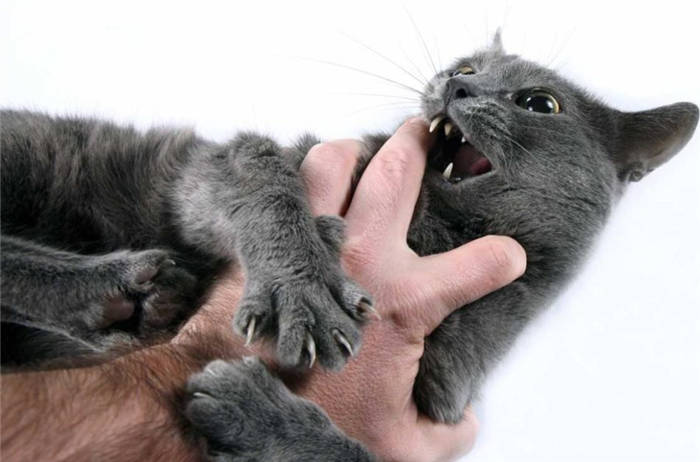
Some cat owners notice that pets are afraid of them. The four-legged pet keeps the person at a distance, hides from him in secluded places, dodges petting, when you try to catch him immediately bites, scratches and hisses. This behavior would upset anyone. If a cat's fear of people persists for a long time, sooner or later it will have a negative effect on its psyche, because it is difficult to live under the pressure of negative emotions for a long time.
There are several reasons why a pet may be afraid of its owner:

- Abuse. Cats are able to remember people and events with which unpleasant emotions are associated for a long time. If the pet is yelled at, beaten, and humiliated in any way, it will feel fear of the person who is hurting it. If somebody accidentally pinched a cat's leg or stepped on its tail and then made amends with affection and a tasty treat, the pet is unlikely to harbor a grudge.
- Too intrusive attitude. You don't have to hit a cat to make it afraid of a human. Forcing him to play or to pet him when he does not want to, may cause him to avoid his owner's company. In this case, the animal is not fearful, but rather does not want the unpleasant situation to happen again.
- Use of hygiene products or perfumes, the smell of which scares the cat away.
- Recently undergone surgery. Some cats transfer their fear of vets who hurt them to their owners.
Mental disorder as a cause of high anxiety

Cats, like humans, sometimes suffer from mental disorders. These conditions can be congenital or acquired, such as from traumatic brain injury, frequent stress or accidental ingestion of potent drugs. You can notice that there is something wrong with a pet not only because he suddenly became anxious. In animals with mental health problems in general, behavior changes. It can be described in one word – inadequate.
Mental disorders in cats may be accompanied by the following symptoms:
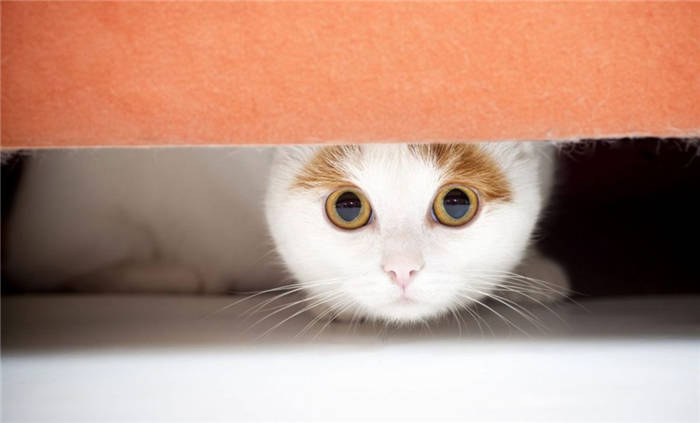
- Fear of familiar objects, other animals and people;
- aimless wandering around the apartment;
- No reaction to external stimuli (cat does not respond to its own name, loud sounds);
- fanatical licking of the coat (the pet can lick itself for hours on end until the appearance of gaps and wounds);
- sudden change of mood from complete apathy to extreme excitement;
- Inadequate response to touching;
- Constant loud, whiny meowing;
- desire to catch themselves by the tail (if it is an adult animal and not a kitten);
- hunting for imaginary enemies;
- Complete refusal of food or consuming it in huge quantities;
- Attempts to eat inedible things (e.g., plaid or paper);
- sitting in a dark corner for long periods of time.
How to minimize the stress of visitors
If your cat is not socialized, is shy or has a highly individualistic personality, it will find the arrival of strangers a very stressful experience. It should be noted at once that the "like cures like" rule does not work here, and any violent contact of the animal with strangers will work to worsen the psychological situation.
As a result, the cat will not only not part with its phobia, but will also lose trust in its owner. There is only one thing left – to distance the animal from the irritant and create for it the most comfortable conditions possible for that time.
So, if you have a visit of relatives or a noisy family party planned, beforehand start giving the pet a mild sedative, such as "Cot-Bayun" or "Stop-Stress".
Take care at Make sure the cat has safe passage around the house by setting up shelters for her in various places. So, for purr-fect, which prefers an upper tier, wall hammocks, hanging cots, ladders or ordinary bookshelves will do.
If the cat prefers to move around the lower and middle tiers, equip a few houses, baskets, tunnels or just put a few small boxes on the floor for him. It is noteworthy that many stripped whiskers love to get into various packing cartons, even if those are frankly small in size.
It is important to think about the interior. The interior should allow the cat to go to the food, water and litter box along a relatively safe route and to be able to instantly hide in a shelter. For a particularly timid pet, place the feeder, drinker and litter box so that it can reach them without making contact with its guests.
You can put several sets in different places in the house. It is especially important not to discourage the pet from the correct habit of going to the litter tray, because once he has made a puddle under the bed in a stressful situation, the pet can repeat it over and over again.
When guests gather, ask them not to force your cat's attention and affection and talk. Establishing contact with the "goodies" is unlikely to work either, because a stressed animal will refuse to eat when the source of the threat is close by. Guests are better not to pay attention to the runaway tail, and perhaps she herself, a little accustomed, will show interest in what is happening.
How to accustom the cat to guests
The behavior of the animal is formed from hereditary prerequisites and personal experience. According to zoopsychologists, the period determining the socialization of cats is up to 8 weeks of age. And if at this time the kitten was isolated from people, then he will treat them warily all his life.
Distrust is also formed in the process of life, for example, if the owner lives in isolation, and his pet simply does not have the opportunity to see other people. Pain and fear once caused by bipeds can also be deeply rooted in the psyche of the cat.
To "toughen up" a cat's nerves, Turn on the TV and music more often. – So the cat will stop being afraid of noises. To wean yourself from being frightened by the sound of the doorbell and the intercom, you can agree with all family members not to use the keys, but to ring the doorbell. Repeated situations will leave the mark that this sound does not bode ill, but, on the contrary, heralds the arrival of "their".
To accustom the kitty to strangers, arrange with a buddy or relative to ring the doorbell, enter the house, take a seat in the room and have an unhurried conversation with the owner. The cat at this time should be close by in a closed and familiar carrier that can pass as a shelter . If the situation will be repeated with different people, the animal will get used to the appearance of guests and the presence of a stranger in its immediate vicinity.
In the initial period of such psycho-training it is not superfluous to give the cat a mild sedative from a pet store. As the cat adapts, the dose of the drug should decrease and eventually go to zero.
As you observe the progress of your pup, try letting him out of the carrier one day in the presence of a guest you already know. All other conditions should be maintained: Quiet conversation, smooth movements and – most importantly! – no attention to the cat. . Most likely, in this case curiosity will overpower fear and the tabby will try to approach the person. However, attempts to stroke the cat and give it a tasty treat should take place a little later.






